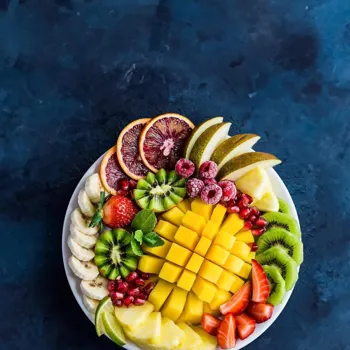Discover the art of mindful eating for a healthier relationship with food. Learn 7 tips to transform your well-being
In today's fast-paced world, where grabbing a quick bite on the go has become the norm,
many of us have lost touch with the simple pleasure of eating. We often eat mindlessly, distracted by our phones, work, or other commitments.

This can lead to overeating, digestive issues, and an overall unhealthy relationship with food. But there's a solution: mindful eating.
Mindful eating is about paying attention to the present moment while you eat, noticing the colors, smells, textures, and tastes of your food.
It's about savoring each bite and listening to your body's hunger and fullness cues. By practicing mindful eating, you can develop a healthier and more enjoyable relationship with food, leading to better overall well-being.
It is all the more important in a country like India where food is intrinsically linked to our culture and celebrations.
Why is Mindful Eating Important?
Mindful eating offers a plethora of benefits that extend beyond just weight management.
It can help you:
Improve Digestion: When you eat mindfully, you chew your food more thoroughly, allowing your body to digest it more efficiently.
Reduce Stress: Mindful eating can be a form of meditation, calming your mind and reducing stress levels.
Increase Awareness of Hunger and Fullness: By paying attention to your body's signals, you can learn to eat only when you're truly hungry and stop when you're satisfied.
Enhance Enjoyment of Food: When you savor each bite, you appreciate the flavors and textures of your food more fully.
Break Free from Emotional Eating: Mindful eating can help you identify and address the emotional triggers that lead to mindless snacking.
7 Tips for Cultivating Mindful Eating
Ready to embark on your mindful eating journey? Here are seven practical tips to get you started:
Create a Calm and Relaxing Environment:
Before you even begin to eat, take a moment to set the stage for a mindful experience. Find a quiet place where you won't be disturbed. Turn off the TV, put away your phone, and avoid any other distractions. You can even light a candle or play some soft music to create a more calming atmosphere.
The goal is to create a space where you can fully focus on your food and your experience.
Engage Your Senses:
Before you take your first bite, take a moment to observe your food. Notice the colors, shapes, and textures. What aromas do you detect? As you bring the food to your mouth, pay attention to how your body reacts. Does your mouth water? Do you feel a sense of anticipation?
This sensory exploration can help you appreciate your food on a deeper level and prepare your body for digestion. This is particularly relevant for Indian cuisine, which is known for its vibrant spices and layering of flavours. This will also help you appreciate the food that has been prepared.
Chew Slowly and Deliberately:
This is perhaps the most crucial aspect of mindful eating. Instead of gulping down your food, take small bites and chew each bite thoroughly. Pay attention to the texture and flavor as the food breaks down in your mouth.
This allows your body to digest the food more easily and helps you feel full sooner. It also gives you more time to savor the experience. By chewing slowly, you are more likely to eat less automatically because your body’s satiation cues have a chance to register.
Put Your Utensils Down Between Bites:
This simple act can make a big difference in your eating habits. By putting your fork or spoon down between bites, you force yourself to slow down and be more present. It also gives you a chance to check in with your body and assess your hunger level. Are you still hungry?
Are you starting to feel full? This pausing will help you consume less.
Listen to Your Body's Hunger and Fullness Cues:
Learning to distinguish between true hunger and emotional cravings is essential for mindful eating. Before you start eating, ask yourself if you're truly hungry or if you're simply bored, stressed, or sad. As you eat, pay attention to how your body feels.
Stop eating when you feel satisfied, not stuffed. It's okay to leave food on your plate. Remember, mindful eating is about nourishing your body, not punishing it.
Practice Gratitude for the Food:
Taking a moment to appreciate the food you're eating can transform your experience. Think about all the people who contributed to bringing this food to your table – the farmers, the truck drivers, the grocery store workers, and the person who prepared the meal.
Express your gratitude for their efforts and for the nourishment that the food provides. This practice can help you develop a deeper connection with your food and a greater appreciation for the abundance in your life.
Be Patient and Kind to Yourself:
Mindful eating is a journey, not a destination. It takes time and practice to develop these habits. Don't get discouraged if you slip up or if you find it difficult to stay focused. Just acknowledge your mistakes and gently guide yourself back to the present moment.

Remember, the goal is to cultivate a healthier relationship with food, and that starts with being kind to yourself.
The journey on mindful eating is also about experimenting with various food preparations. Try incorporating different vegetables and fruits in your diet.
A mindful eater always appreciates the health that the food brings and tries to be conscious in their eating as often as possible. It is about respecting the processes and the food on our plates.
Mindful Eating: A Path to a Healthier You
Mindful eating isn't just a diet; it's a way of life.
It's about cultivating a conscious and compassionate relationship with food, your body, and yourself. By practicing these seven tips, you can transform your eating habits, improve your digestion, reduce stress, and enhance your overall well-being.
So, take a deep breath, slow down, and savor each bite. Your body and mind will thank you for it.
Embarking on the path of mindful eating is a personal journey and requires a commitment to developing new habits.
Be patient with yourself, celebrate small victories, and remember that every mindful meal is a step toward a healthier and more fulfilling life. Try to find the time to eat mindfully as often as you can. When eating mindfully, there is room to appreciate the simple pleasures of life.















